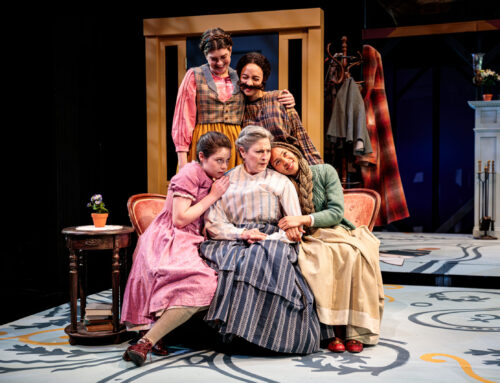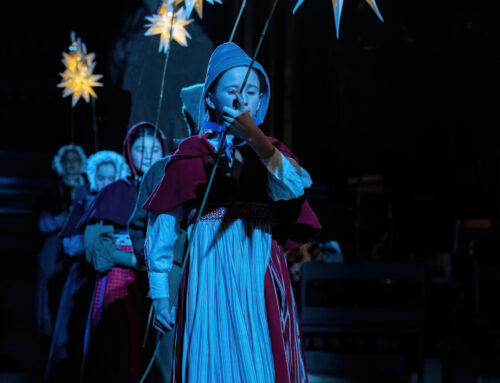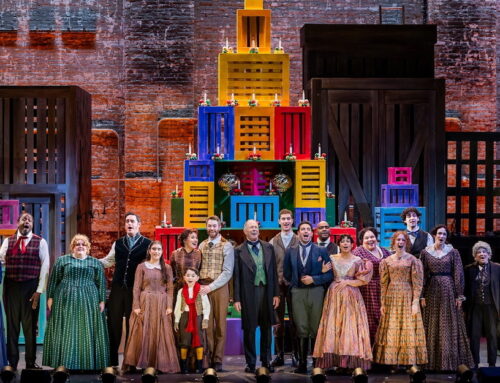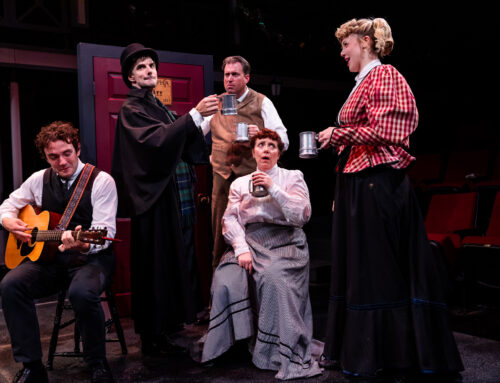Two nights ago at Boston’s Opera House MOTOWN The Musical moved everything– except me. Sets, settings, singers, dancers, plot lines: race, romance, business, music, internal politics– it’s all up there onstage. Here come the Supremes! What’s goin’ on with Marvin? Who are these Jackson kids? Smokey is a daily miracle. They’re dancing in the streets–Martha and her Vandellas, Gladys and her PIPS! Look out– now they’re rioting in the streets. Here comes Mary Wells and “My Guy.” There go The Temptations and “My Girl.” Martin Luther King Jr. gets sandwiched between Ed Sullivan, Stevie Wonder, and that super freak Rick James. What happened to Flo? Who cares! Diana is the the apple of Motown Mogul Berry Gordy’s eye, even if he’s impotent in the sack. HUH? The guy is juggling many balls, as is this show– and drops all of them.
That said, MOTOWN is a platform for a stunning array of talent, some dazzling staging, and a collection of music that propelled us through puberty in the carefree late 50’s and into a turbulent 60’s coming of age. But without a compelling, focused narrative, it’s a blur. The show wants to be both a musical review, and a moving true life tale. The advantage of a musical like DREAM GIRLS or JERSEY BOYS, is that they each immerse us in a single musical catalogue, ONE story to hang all the rest on. MOTOWN is a riot of riches, and takes on the entire MOTOWN catalogue, attempting to touch on every story, any one of which is complex enough to hang a show on.
The through line that’s supposed to keep us tethered is the personal story of how motor city magnate Berry Gordy built his empire. The action flashes back to 1938 and a formative moment in his childhood when he and the rest of the world witnessed African-American boxer (and Detroit inhabitant!) Joe Louis knock out the German Max Schmeling on the eve of World War II to become world heavyweight champ, an athletic triumph carrying extraordinary political and social symbolic weight. Locally, one-time featherweight boxer Berry Gordy found his sweet spot championing the music of black artists and their hits found a home at his fledgling record company– Hitsville U.S.A. !
At the end of the show, the boxing moment is referenced, but carries no punch. Its energy has been dissipated as the show whirls from Detroit to Manchester, Pasadena to Paris, L.A. to the Bahamas. The script flails in an attempt to cover it all, never gathering dramatic momentum, never pausing long enough for us to fully engage. MOTOWN doesn’t know what to leave out, and so leaves it all in. It’s a numbing pastiche of number one hits, with no time for any of these artists, and sometimes their songs, to register emotionally. I was more dazed than amazed.
Somehow, in all the helter skelter, I was able to grab onto Jarran Muse as Marvin Gaye singing a revelatory “Mercy, Mercy Me” a cappella. That moment felt so right and was such a blessed relief. Then there was Martina Sykes as Mary Wells holding a single note, long and strong, to shake, rattle and roll the rafters. Allison Semmes channeled Diana Ross’s elegance and tone, while Leon Outlaw, Jr. was remarkably convincing as young dynamo Michael Jackson. Finally there was Julius Thomas III left to shoulder the emotional weight of the show as Berry Gordy. The man can sing, really sing, and in fact, makes us sit up and take notice in a second act solo that isn’t even a MOTOWN hit. He’s that good. But as an actor, he lacked presence, and the part is paper thin.
MOTOWN’s book is of biblical proportions; it would take Smokey Robinson and some miraculous editing to turn this tale of artists as prodigals returning home in triumph– into a truly moving parable for our times. In MOTOWN The Musical–less would definitely be MO.
MOTOWN The Musical at Boston’s Opera House through February 15!






Leave A Comment
You must be logged in to post a comment.